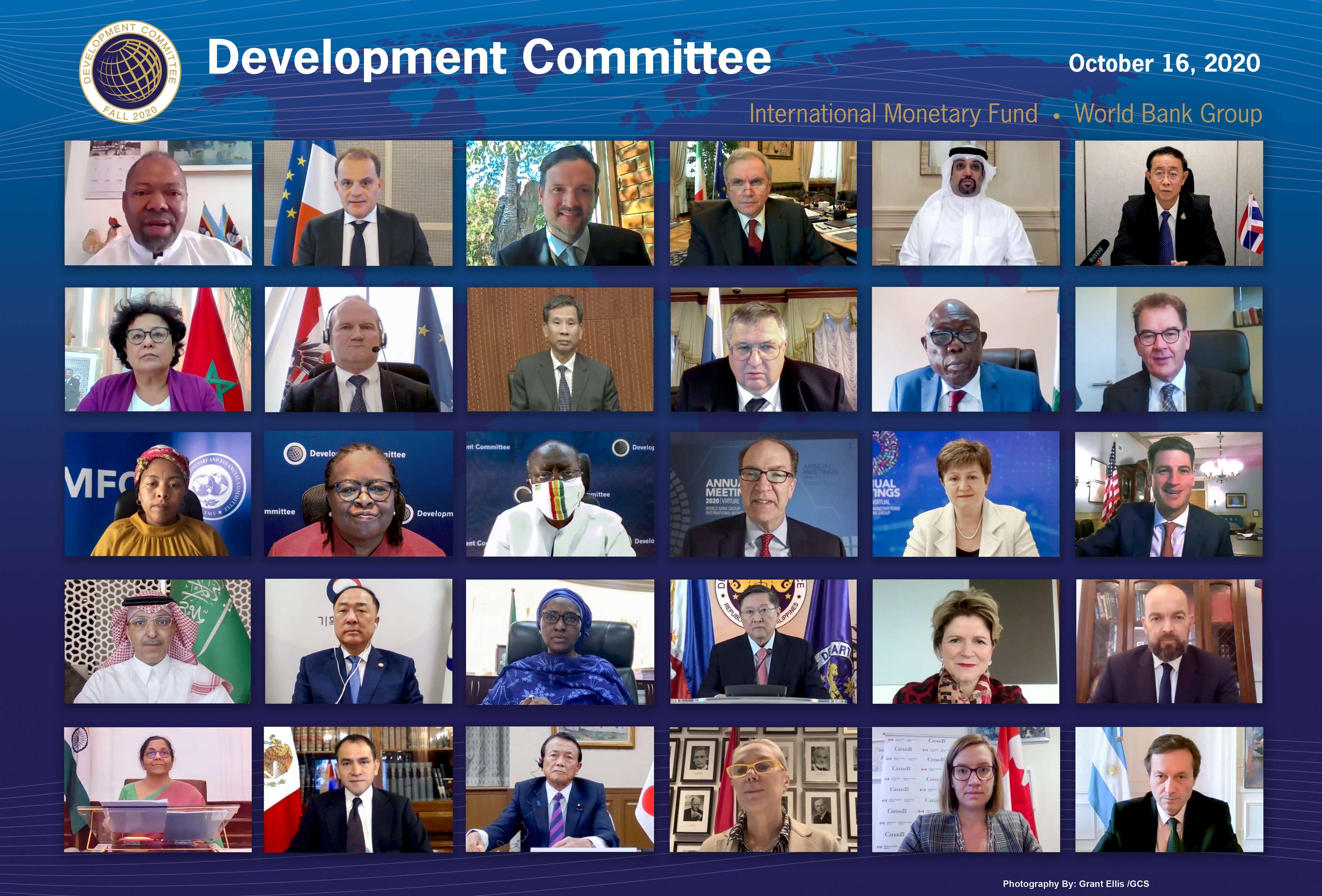
The COVID-19 pandemic continues to devastate countries, overwhelming health systems, disrupting productivity, threatening food security, multiplying job losses, and reducing incomes, particularly for the poorest. It has led to the largest global economic contraction in eight decades, affecting all economies and causing investments, trade, and remittance flows to plummet. The global crisis is threatening the lives and livelihoods of the most vulnerable by increasing poverty, exacerbating inequalities, and damaging long-term economic growth prospects. It requires a comprehensive, robust global response from the development community.
These were key messages from the Development Committee, a ministerial-level forum that represents 189 member countries of the World Bank Group and the International Monetary Fund, in a communiqué issued at the institutions’ Annual Meetings. The meetings were convened online.
In his speech at the event’s plenary session, World Bank Group President David Malpass underscored these concerns, noting that the pandemic “could lead to a lost decade characterized by weak growth, a collapse in many health and education systems, and a new round of sovereign-debt crises.”
The committee commended the World Bank Group and IMF for the speed and scale of their COVID-19 response, while urging continued work with member countries, the public and private sectors, local and bilateral development partners, and other international organizations. The committee noted the Bank Group’s delivery of $45 billion in COVID-related financing in the final quarter of fiscal year 2020. Operations are underway through IBRD, IDA, IFC, and MIGA in more than 100 countries, with capacity for up to $160 billion in financing through June 2021. The committee expressed support for the Bank Group’s focus on health, social, and economic responses, as well as policies, institutions, and investments that will be critical to resilient, inclusive, and sustainable recovery. They stated that the Bank Group plays a critical role in key global challenges, and that it is by helping countries rebuild stronger and better that it can achieve its mission – to end poverty and boost shared prosperity – as well as support countries’ development goals.
In his speech, Malpass focused on the human dimensions of the crisis, starting from the World Bank’s new projections that an additional 110 to 150 million people will fall into extreme poverty by 2021. With the pandemic taking a heavy toll on human capital, he highlighted the World Bank’s support for remote learning in 65 countries and its partnership with UNICEF and UNESCO on reopening frameworks for schools. Looking ahead, he urged collaboration to support an inclusive and resilient recovery. He stated that “countries will need to allow capital, labor, skills, and innovation to shift to a different, post-COVID business environment” and that, during the recovery, “it is critical that countries work toward their climate and environmental goals.”
With emergency health projects well underway to support the purchase of masks, emergency room equipment, and other COVID-related supplies, both the committee and Malpass stressed the importance of an effective COVID-19 vaccine as the most promising path for the world to reopen safely. During the meetings, the World Bank announced plans to make available up to $12 billion to developing countries for purchase and deployment once vaccines become available. IFC is also investing heavily in manufacturers of vaccines and related supplies through its $4 billion Global Health Platform. These efforts will support affordable and equitable access for the poorest and those most at risk.
The week also saw the G20’s extension of the Debt Service Suspension Initiative (DSSI) through the first six months of 2021. First championed by the World Bank Group and IMF, it allows low-income countries to suspend their debt service payments to official bilateral creditors. Noting that “the DSSI is creating much needed fiscal space and supporting the financing programs of the WBG and IMF for the poorest countries,” the committee encouraged further actions by multilateral development banks as well as participation by private creditors. Malpass remarked at the committee meeting that debt suspension is an important stopgap, but not enough: “Looking beyond DSSI, we must consider debt stock reduction. Otherwise there’s no light at the end of the debt tunnel for the people in the debtor countries.”
This year’s meetings are immediately followed by End Poverty Day, on October 17. Echoing the concerns about how the pandemic is affecting human capital, a virtual event entitled “Surmounting Setbacks” includes videos from young people from around the world, many of whom expressed optimism and offered suggestions on what countries can do to build a resilient recovery.
In a similar spirit, in his remarks at the G20, Malpass said, “Even in the midst of a once-in-a-century crisis, I have confidence that sustainable solutions will emerge, in part by embracing constructive change.” His plenary speech expanded on this vision: “Working together, I believe that we can shorten the downturn and build a strong foundation for a more durable model of prosperity: one that can lift all countries and all people.”

